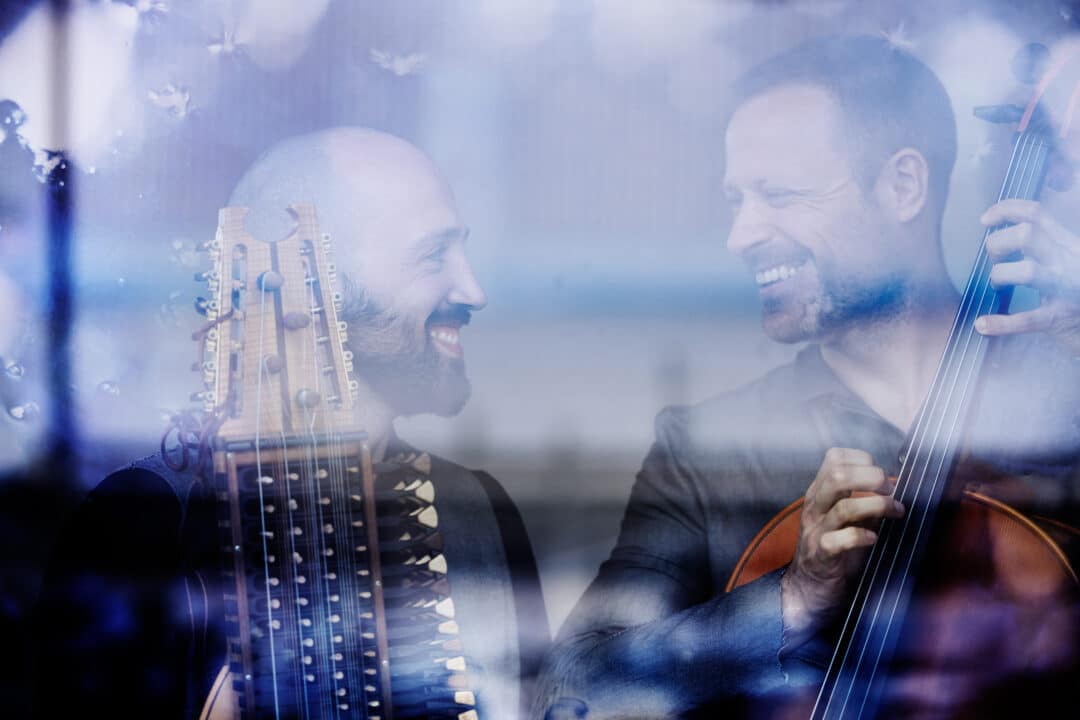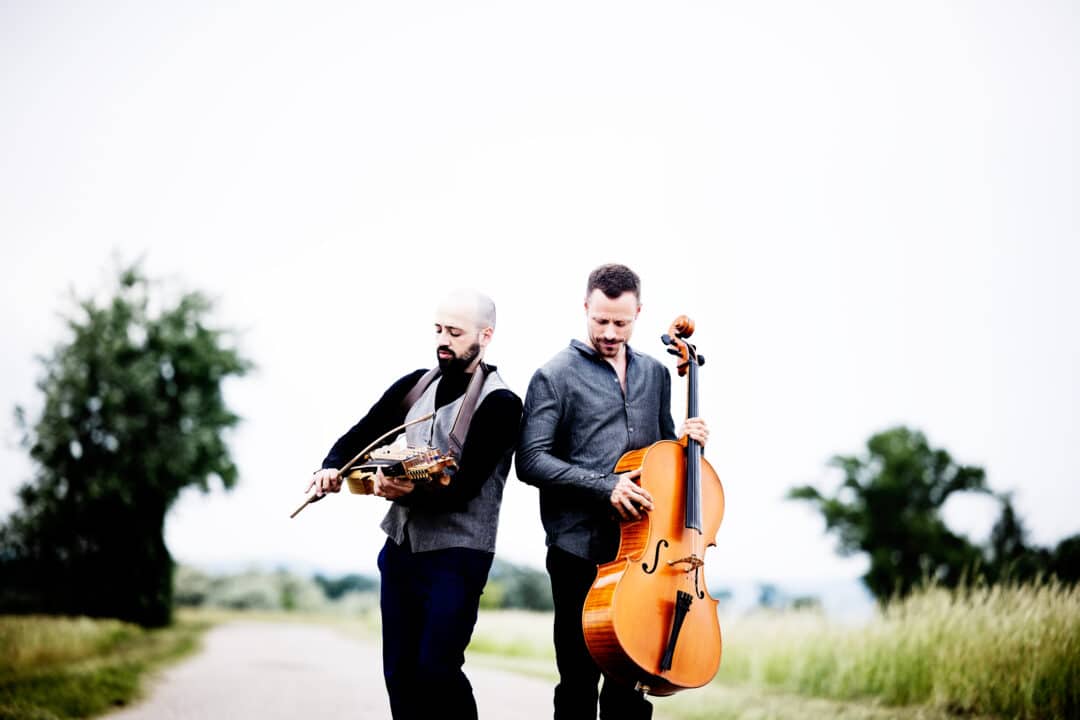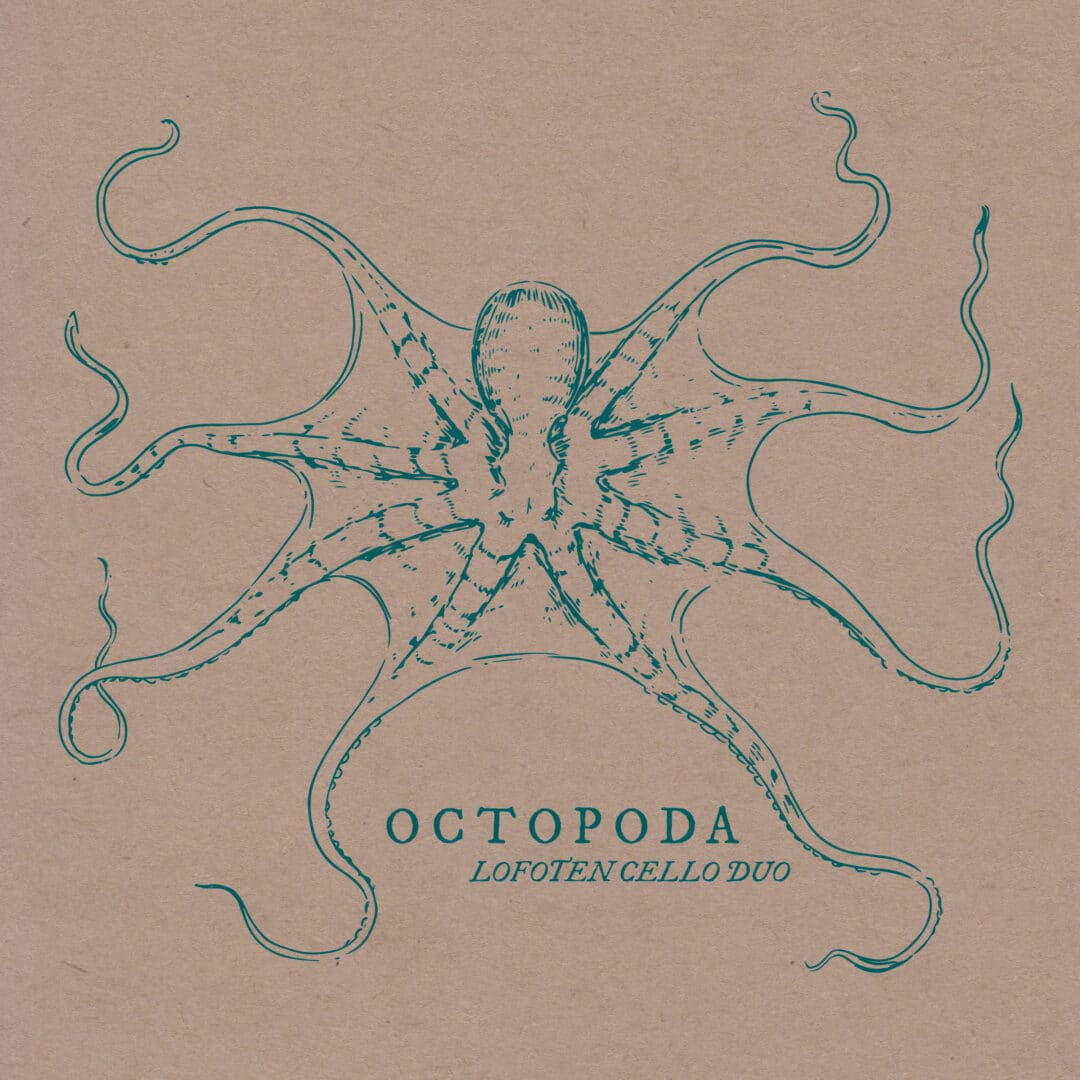
Two cellists playing folk music together sounds unusual, but comes quite naturally in Lofoten Cello Duo’s case. Their repertoire combines the diverse oral tradition of ethno music from around the world from time immemorial to the present. Carles Muñoz Camarero and Håvard Enstad talk about the Stockholm syndrome in a duo and “Fernweh”-folk.
It often seems to be a good sign, when music is hard to describe, when journalists like me fail to pigeonhole a record like your latest. How would you describe your music?
Håvard Enstad: In one term I would say: contemporary folk.
Come on. That’s too easy. You make me look bad now.
Muñoz Camarero: (laughs) We started to take inspirations from hundred years old music or even older music and transferred it so something own. That’s why the term “contemporary folk” fits well. Meanwhile we compose music in that style as well. We are influenced by this kind of music we were consuming over the last years and also jamming with.
How can we imagine the process of finding inspiring sounds? You do some research in your field, look for old folk music that fits your style and adapt it by re-arranging; because most of it is not composed for two celli, as I presume, is it?
Muñoz Camarero: None of the music we are playing is arranged for two celli, no.
So how would you describe the typical procedure? How do you find the stuff you get hooked on? Is it by surfing and being led to unknown, interesting fields by algorithmic suggestions?
Håvard Enstad: Some of the stuff we learn from musicians all around the world, from where the pieces are from. Also I discover a lot of music by listening to it on Spotify, as you said, by randomly searching…
Muñoz Camarero: For this purpose Spotify is quite good.
Håvard Enstad: And when we find something we like, we do not really care where it comes from. It’s like: “Okay, we want do this!” And then we make our own interpretation, so that it fits to our sound and our skills.
Muñoz Camarero: If you compare it to our first two albums, we are trying to use new techniques and other instruments like the nyckelharpa. We are using a lot of voice, combined with voices. We try to expand the usual classical concept of the cello. Maybe that’s the reason for you saying it’s hard to describe the genre of our music. Is it classical? is it folk? Is it jazz, because the next event we are playing is called “Kick Jazz“? But are we jazz? I wouldn’t say so, but I am very happy, that the festival-organisers are so open-minded.

Taking into account, how many pop-bands are playing in the jazz-context nowadays, it seems only fair that a contemporary folk duo gets a chance too…
Muñoz Camarero: Yeah, but as an audience you could get confused.
Your new album shows a great variety of genres, from eastern to western style, from Norwegian to Catalan. Would you say, that there is something like a red thread? Sometimes you feel like it’s northern folk at the beginning of a song, and in the end you find yourself on a completely different place without having noticed the change. So you cannot tell where exactly the music comes from – which style it is – because it is blended together so cleverly. Is there something like a concept, when you start a new album?
Håvard Enstad: I wouldn’t say it’s a concept. We use our imagination. It’s one style, one sound.
We do most of the stuff together and then we have this synergy. This unity between the songs is because we work on them in the same way. That’s the red thread.
Let’s talk about the founding myth of your duo: Your first appearance together was in an art nouveau flat in Barcelona. Over vermouth and home-brewed beer, the two of you found together and decided to continue this format of fusing Scandinavian and Catalan folk music. How was it?
Muñoz Camarero: Life changing. The guy, who had this apartment at the time, is a very good friend of Håvard. He asked him to play at his birthday party. As Håvard originally is a fantastic piano player, he wasn’t not confident enough to play solo cello in front of many people in a close and intimate apartment atmospher. So he asked me, because we had met a few months before at university. He said: “Let’s make a deal. I show you a few Scandinavian tunes and let’s see how it goes. And it went really well. He taught me a few tunes he had learnt at the ethno-festivals he had been to. The gig was very successful and we decided to go on. Almost ten years later we are still playing together and are putting out our third record.
I read that you, Carlos, have been the “victim” of Håvard. Is that true?
Muñoz Camarero: That was meant ironically. Maybe it was a bit of a Stockholm Syndrome, because I was captured.

Let’s talk about your individual musical backgrounds. Where do you both musically come from?
Håvard Enstad: I was trained a classical pianist in Oslo, did my last year in Barcelona and got stuck there. I started playing cello, when I was sixteen, because I was super-fascinated about it. Where I come from, literally nobody was playing the cello. I hadn’t seen a single cello in my life. When I came to Oslo to go to the high school there, I borrowed one and started playing. Back then I was very much into classical music, quite nerdy and not interested in other styles. Later I had a break from university and worked in a school, where they had a focus on folk music, and I began to like it. From then on I went to folk festivals and brought my cello. I continued to play classical music on the piano and on the cello I played folk. I did it this way for years. Now it’s 50:50 between cello and piano.
Muñoz Camarero: I am a classical trained cello player, started at the age of five. In the last year of studying in Barcelona I had the luck to be selected for participating in a meeting of classical students coming from all over Europe, from different musical departments in Den Haag. There I met the Messi of cello outside the classical context: Ernst Reijseger. He does many things you can’t learn anywhere, he sings, does percussion on the instrument – a big inspiration. I had the luck to see how many possibilities there really are.
As a consequence of this meeting I started to try out different things. So when Håvard came up with his proposition, he found an open door. At the moment he asked, I was also a bit deceived by the way classical music-business works, people being burnt out, playing the same repertoire again and again, lacking creativity. Today I still play after notes, but I enjoy much more to improvise. When I came to Austria, I studied jazz and improvised music in Linz.
From the moment you guys met and had a good first concert, how difficult was it to play and stay together?
Muñoz Camarero: In the beginning it was quite easy. It was like: Let’s try out a few things. We had a few concerts in small settings like the first one, even at Håvard’s place.
After a few years I decided to move out because of love. After the decision I took, it became more serious.
Håvard Enstad: We recorded our first CD, after you had left, yes.
Muñoz Camarero: It was a very productive phase. I don’t know, if this would have happened, if I had stayed in Barcelona. We met only every three or four months to play concerts together. These small meetings for three or four days we used to learn more repertoire, to jam around, and somehow it became something very natural, that we record CDs.
So, how does it go, when you both are on your own? You do research, and later, when you meet, you try out the stuff or do you send sound files to and fro and work on them continuously?
Muñoz Camarero: Recently it works like this: We do some research and send files to give the other one an idea, and then, when we meet, we work on the stuff together and try out, if it sounds cool, if it is promising.

Your duo is named after the group of islands in the north of Norway. Why did you choose this name? Does it have a special meaning?
Håvard Enstad: One of the hardest things, when you have a project like this, is to find a name for it. We were struggling. Then we found out that a friend of mine, a cello player, is from lofoten and had started a festival there. Carlos has always been fascinated by the north. In addition to that in Catalan dialect “lofoten” means: Let’s do it. So this double meaning felt suitable
Muñoz Camarero: And lofoten means claw of a lynx, because the islands are formed like this.
Let’s talk about the new album “Octopoda”. Do you feel like this new work is continuing your way so far or is it a new step, that leads you to something new?
Håvard Enstad: We had guest musicians for the first time, which was a very enriching experience, and I hope we can continue this. It doesn’t have to be the same line up on CD and live in concert. We don’t have to play it the very same way.
Muñoz Camarero: I would say it’s both. It is continuing our way, but also expanding.
The octopus stands for the new, that we expand our ranges. Havin all these great guys, Florian Sighartner on violin, Òscar Antolí on clarinet, Amir Wahba on percussion and a very good friend of ours from Armenia, Vigen Hovsepyan with his voice and on percussion was a development and it turned out that taking the risk was a very good decision.

What are the plans after your gig at “Kick Jazz”? I saw that you play in Saalfelden next year. Are many concerts planned?
Muñoz Camarero: The situation is difficult, but at the same time stimulating. It is definitely more challenging than before Corona. A lot of concerts were postponed and have created a concert-jam. We feel in a very privileged position to play in Porgy. That gives us visibility, and I hope that this expands our tentacles. If a few nice things like concerts in Norway and Sweden came up, it would be helpful. Also it would be helpful to have an agency behind us, because at the moment we do everything on our own, which is very exhausting. We would love to be able to concentrate more on the music. But we are very positive.
When I listen to your music, I get the feeling of “Fernweh”, a German word, for which no proper English translation exists. It means the feeling of pain, because you are not away on a travel of some sort.
Is there a Norwegian word for it?
Håvard Enstad: Does it mean the opposite of homesickness?
Yes. Exactly.
Håvard Enstad: (thinks for a while) No, not really.

Muñoz Camarero: It’s strange, because you are not the first person to say this. Especially after concerts people show up and keep us telling that they feel “Fernweh” listening to our music. So we often get this feedback. It’s nice to have the privilege of…
…making people feel bad, because they are at home?
Muñoz Camarero: (laughs) I wouldn’t say it this way. I am travelling a lot making this music.
People, who do not travel, couldn’t make music like that.
Muñoz Camarero: Our music tries to be thankful to these cultures, we have taken inspirations from, thankful for this heritage. That’s what we want to show people: What’s outside their boxes. And give hope in these difficult times, when people are struggling.
Markus Deisenberger
